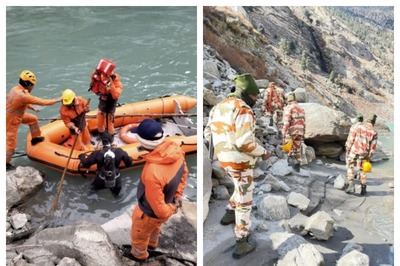
views
As the rain clouds gather and the pitter-patter of raindrops fills the air, the monsoon season brings with it a sense of relief from the scorching heat of summer. However, along with the soothing showers, this season also brings a host of health challenges, with one of the most common being fevers. Various factors, including changes in weather patterns, increased humidity, and the proliferation of disease-carrying mosquitoes, can cause monsoon fevers. Understanding the different types of fevers that can affect you during this season is crucial for timely diagnosis and appropriate treatment.
So, let’s explore the world of monsoon fevers and equip ourselves with valuable knowledge to stay healthy and enjoy the beauty of this season to the fullest. Dr. Ashish Bajaj, M.D Microbiology, Medical Microbiology, Head Technical Operation, North Zone, Oncquest Laboratories Ltd., Gurugram explains the different fevers:
- Viral feverDuring the monsoon season, viral fevers are prevalent due to increased viral activity. Symptoms of viral fevers include fever, sore throat, cough, runny nose, body aches, and fatigue. To get relief from symptoms, it’s recommended to rest, stay hydrated, and take appropriate medications.
- Dengue feverThe monsoon season is a common time to contract Dengue fever, a viral infection transmitted by mosquitoes (Aedes species). Its symptoms include high fever, severe headache, joint and muscle pain, rash, and severe bleeding. Early diagnosis and proper hydration are important for managing dengue fever.
- Malaria feverMalaria is transmitted through mosquito bites caused by a parasite. Its symptoms include severe chills, shivering, headaches, and body pain. This potentially fatal illness can lead to serious complications such as brain damage, breathing difficulties, organ failure, or low blood sugar.
- Typhoid feverTyphoid fever, resulting from infection with the Salmonella Typhi bacteria, is commonly spread through contaminated food or water. Its symptoms include persistent high fever, headache, abdominal pain, diarrhoea or constipation, loss of appetite, and weakness. Timely medical intervention, appropriate antibiotics, and adequate fluid replacement are crucial in effectively managing typhoid fever.
- Leptospirosis feverIt is an infection caused by bacteria and is typically contracted when individuals encounter polluted water or soil, particularly in flood-prone areas. The range of symptoms includes a high fever, intense headaches, muscle aches, chills, and feelings of nausea and vomiting. Consuming the right dosage of antibiotics is crucial to prevent complications.
- Chikungunya feverMosquitoes can transmit chikungunya, a viral infection that causes sudden high fever, severe joint pain, muscle pain, headache, fatigue, and rash. To manage chikungunya fever, getting proper rest, managing pain, and staying hydrated are important.
Precautions during monsoon
During the monsoon season, it is crucial to take precautions to minimize the chances of contracting these fevers. Prioritizing personal hygiene through frequent handwashing, utilizing mosquito repellents, nets, and screens to prevent mosquito bites, and maintaining proper sanitation in your living surroundings are essential steps. Additionally, avoiding uncooked or contaminated food and water is advisable. Also, stay hydrated and follow a nutritious diet to strengthen your immune system. Following these precautions, one can significantly reduce the risk of falling ill during the monsoon season.
Be watchful about various fevers and their symptoms during the monsoon season to ensure timely diagnosis and effective treatment. If you experience persistent fever along with other associated symptoms, it’s recommended to consult a healthcare professional for an accurate diagnosis and appropriate management.
Additionally, it is recommended to visit a reputable diagnostic laboratory that offers a comprehensive fever panel test, including a Complete Blood Count (CBC), Erythrocyte Sedimentation Rate (ESR), Widal Test, Malarial Antigen Test, and routine urine examination, to detect the cause of fever. Also, remember that prioritizing preventive measures is essential to stay in good health and fully enjoy the delights of the monsoon season.




















Comments
0 comment